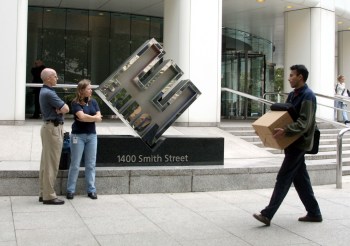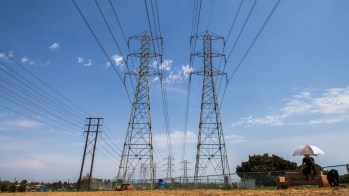The mandatory 401K
Share Now on:
The mandatory 401K
KAI RYSSDAL: It’s just one word: Enron. But right away you all know what I’m talking about. Cheating right? Greed and corruption and a whole lot of lying. Where’s the personal finance you ask? Well think retirement. I’m Kai Ryssdal and this is Marketplace Money from American Public Media.
Stock in former Enron executives Ken Lay and Jeff Skilling took a dive this week. They were convicted for their roles in the company’s collapse. Investors lost their shirts. But Enron employees lost billions, because their retirement plans were tied up in company stock.
That might be why just one in five Americans take advantage of company 401k’s. At most firms, new hires are asked if they want to setup a 401k. That’s called opting in. Now, some employers are trying a different tactic, as Marketplace’s John Dimsdale reports.
JOHN DIMSDALE: It’s less than an hour before opening at the huge Costco warehouse store in Gaithersburg, Md. Five-thousand customers are expected today and the forklifts fly by with pallets of cornflakes and blue jeans.
A year and a half ago, Costco switched from a traditional opt-in tax-deferred retirement plan for its 68,000 employees to an automatic enrollment policy.
PAUL PULVER: We found our enrollment rate with our new employees was not what we wanted it to be.
Paul Pulver is Costco’s vice president of operations for the Northeast region.
PULVER: We were about 47 percent enrollment rate and since we switched to automatic enrollment, our enrollment rate among our new employees is over 90 percent.
Since Costco matches employee contributions to 401k retirement plans, having more participants costs the company money. But Pulver says it’s worth it.
PULVER: In our industry we have one of the lowest turnover rates, and we have one of the most productive employees. Part of the way we can show we care about them is making sure we have great benefits, and one of those benefits is the automatic enrollment program in the 401k. It just makes good business sense.
That message is catching on. Close to a third of large companies with 401k plans now make enrollment automatic. The word is being spread by an unlikely political duo: two unsuccessful vice presidential candidates from opposing parties, John Edwards and Jack Kemp. Kemp says it started as a strategy to battle poverty.
JACK KEMP: Edwards and I talk a lot around the country in fora that we can elaborate upon this way to expand the retirement savings accounts of lower and moderate income people. A lot of people have 401k’s. A lot of companies have ’em. We’re just suggesting they change the default plan to make it an automatic savings.
And since most companies match some portion of their workers’ 401k contributions, Kemp says participation is a good deal for employees.
KEMP: Particularly those who haven’t yet had a propensity to save. Like younger workers don’t think about retirement. I don’t blame ’em. I didn’t when I first started out my pro-football career. You know, I was bullet proof. I didn’t want to save for my retirement. But now that I’m 70 years of age and I begin to look back on my career, I wish somebody had had an automatic deduction for my 401k. I would have put up with it.
But while automatic enrollment is a positive trend, it’s not enough says the Director of the Center for Retirement Research, Alicia Munnell.
ALICIA MUNNELL: Because if you just have people automatically enrolled, the tendency on employers’ part is to be cautious, to put them in at very low contribution rates and put them into a money market fund.
Most companies start workers out contributing three percent of their salaries to 401k’s. Munnell says six percent would be more realistic and for younger workers, she believes the money should be invested in more aggressive stock funds.
MUNNELL: I think employers are waiting for a signal. It might come in June, from the Labor Department, to say that this is an OK thing to do. And OK means that if things go wrong, that the stock market tanks or something like that, the employer will not be held responsible.
According to the Center for Retirement Research, American workers nearing the end of their careers average only $60,000 in their 401k accounts. Not enough, Munnell says, to support 20 to 25 years of retirement.
MUNNELL: And then the thing that we haven’t talked about at all is what are people going to do at retirement. They don’t have a clue. And “they” includes me. How do you allocate that amount of money over an uncertain lifetime. Do you just try to live off the interest and scrimp? Do you try to figure some drawdown rate? I think whatever things we’ve been worrying about during the accumulation phase, we’re going to see much more serious problems during the decumulation phase.
So, it seems, there’s always something. But we’ll leave that worry for another day.
In Washington, I’m John Dimsdale for Marketplace Money.
There’s a lot happening in the world. Through it all, Marketplace is here for you.
You rely on Marketplace to break down the world’s events and tell you how it affects you in a fact-based, approachable way. We rely on your financial support to keep making that possible.
Your donation today powers the independent journalism that you rely on. For just $5/month, you can help sustain Marketplace so we can keep reporting on the things that matter to you.
















